新概念英语第一册95-96课课件(共27张PPT)
文档属性
| 名称 | 新概念英语第一册95-96课课件(共27张PPT) | 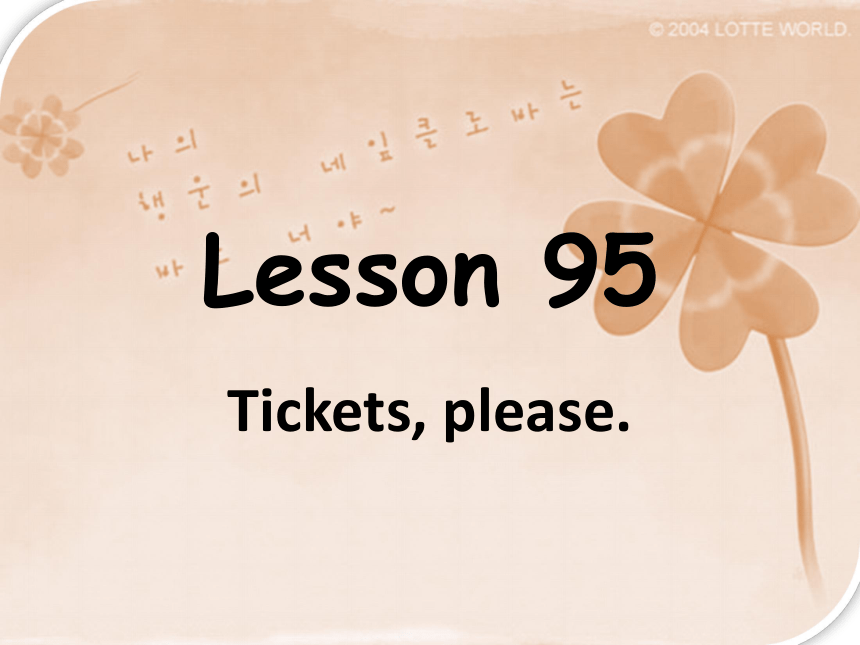 | |
| 格式 | ppt | ||
| 文件大小 | 701.5KB | ||
| 资源类型 | 教案 | ||
| 版本资源 | 新概念英语 | ||
| 科目 | 英语 | ||
| 更新时间 | 2024-03-08 08:04:44 | ||
图片预览

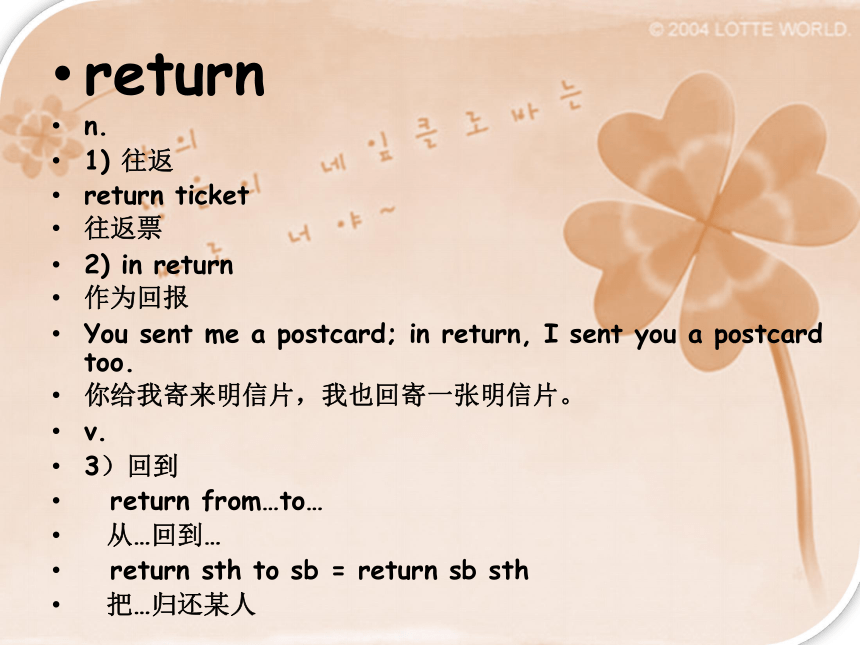
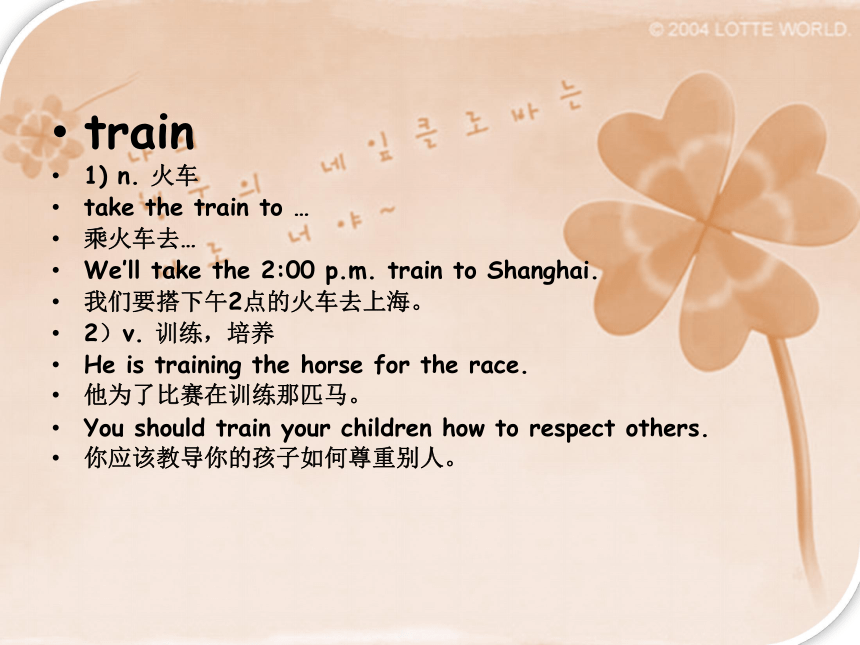
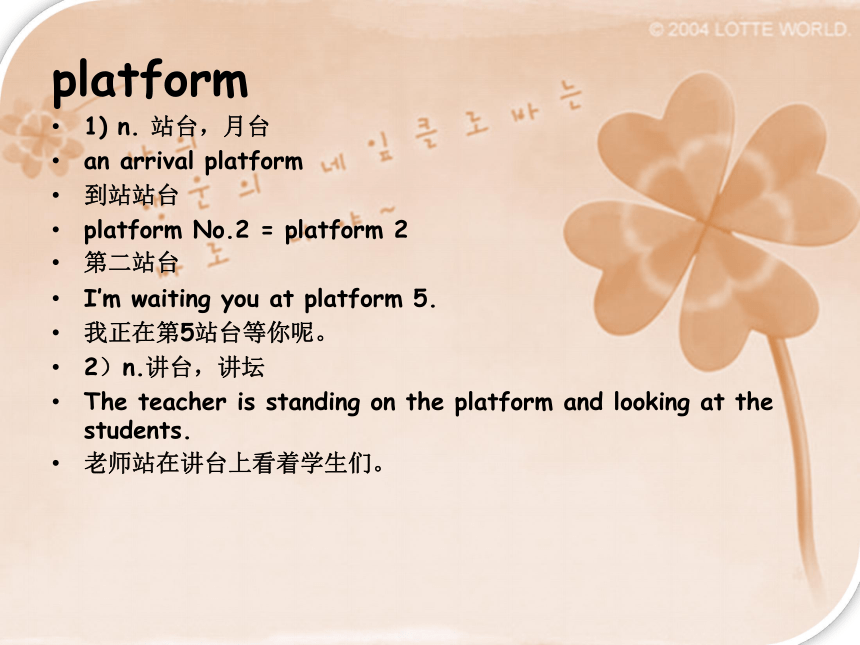
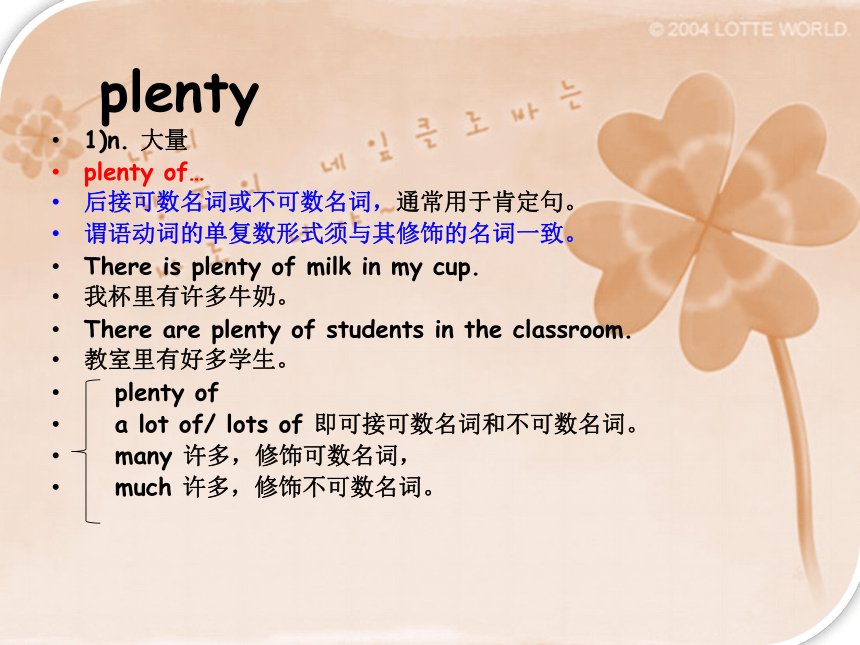
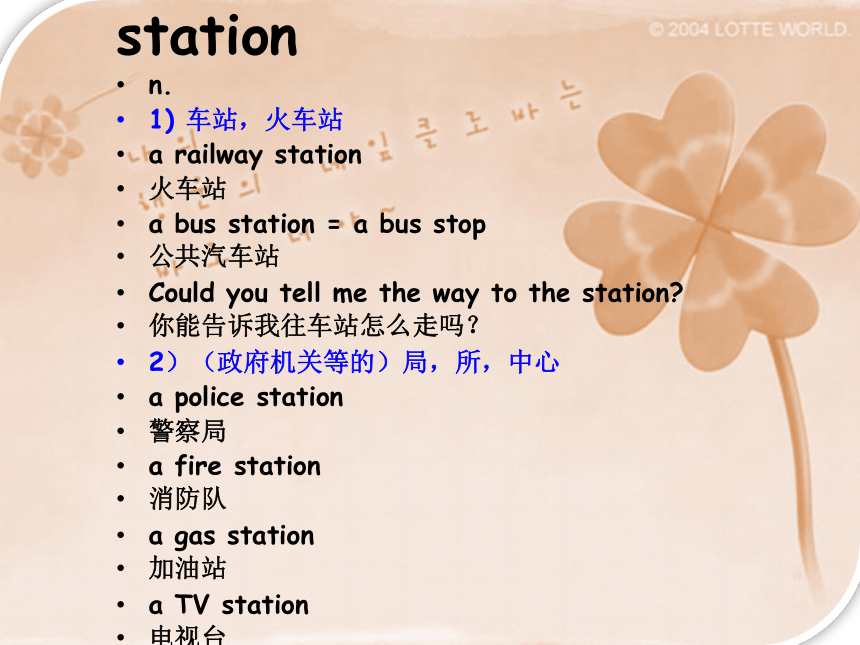
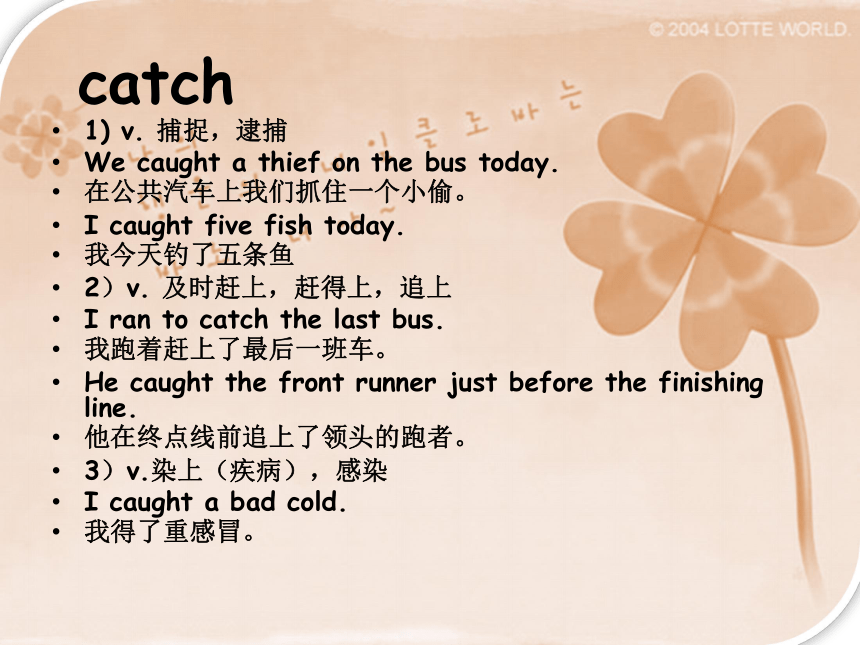
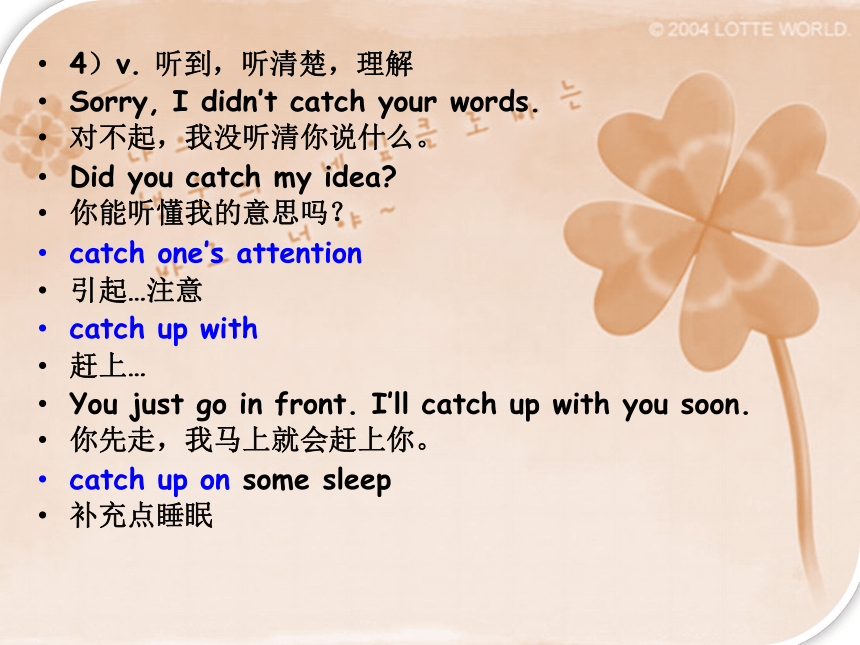
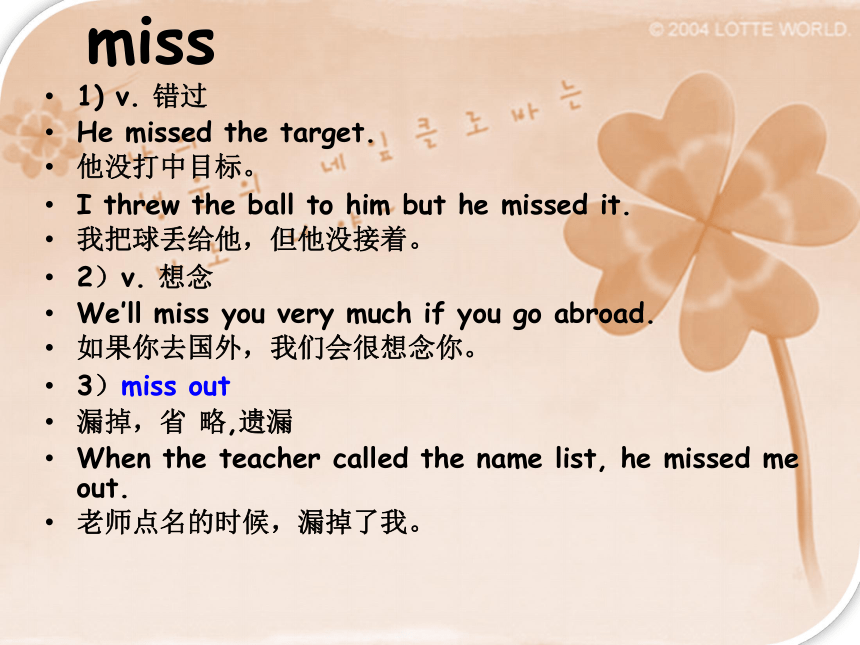
文档简介
(共27张PPT)
Lesson 95
Tickets, please.
return
n.
1) 往返
return ticket
往返票
2) in return
作为回报
You sent me a postcard; in return, I sent you a postcard too.
你给我寄来明信片,我也回寄一张明信片。
v.
3)回到
return from…to…
从…回到…
return sth to sb = return sb sth
把…归还某人
train
1) n. 火车
take the train to …
乘火车去…
We’ll take the 2:00 p.m. train to Shanghai.
我们要搭下午2点的火车去上海。
2)v. 训练,培养
He is training the horse for the race.
他为了比赛在训练那匹马。
You should train your children how to respect others.
你应该教导你的孩子如何尊重别人。
platform
1) n. 站台,月台
an arrival platform
到站站台
platform No.2 = platform 2
第二站台
I’m waiting you at platform 5.
我正在第5站台等你呢。
2)n.讲台,讲坛
The teacher is standing on the platform and looking at the students.
老师站在讲台上看着学生们。
plenty
1)n. 大量
plenty of…
后接可数名词或不可数名词,通常用于肯定句。
谓语动词的单复数形式须与其修饰的名词一致。
There is plenty of milk in my cup.
我杯里有许多牛奶。
There are plenty of students in the classroom.
教室里有好多学生。
plenty of
a lot of/ lots of 即可接可数名词和不可数名词。
many 许多,修饰可数名词,
much 许多,修饰不可数名词。
station
n.
1) 车站,火车站
a railway station
火车站
a bus station = a bus stop
公共汽车站
Could you tell me the way to the station
你能告诉我往车站怎么走吗?
2)(政府机关等的)局,所,中心
a police station
警察局
a fire station
消防队
a gas station
加油站
a TV station
电视台
catch
1) v. 捕捉,逮捕
We caught a thief on the bus today.
在公共汽车上我们抓住一个小偷。
I caught five fish today.
我今天钓了五条鱼
2)v. 及时赶上,赶得上,追上
I ran to catch the last bus.
我跑着赶上了最后一班车。
He caught the front runner just before the finishing line.
他在终点线前追上了领头的跑者。
3)v.染上(疾病),感染
I caught a bad cold.
我得了重感冒。
4)v. 听到,听清楚,理解
Sorry, I didn’t catch your words.
对不起,我没听清你说什么。
Did you catch my idea
你能听懂我的意思吗?
catch one’s attention
引起…注意
catch up with
赶上…
You just go in front. I’ll catch up with you soon.
你先走,我马上就会赶上你。
catch up on some sleep
补充点睡眠
miss
1) v. 错过
He missed the target.
他没打中目标。
I threw the ball to him but he missed it.
我把球丢给他,但他没接着。
2)v. 想念
We’ll miss you very much if you go abroad.
如果你去国外,我们会很想念你。
3)miss out
漏掉,省 略,遗漏
When the teacher called the name list, he missed me out.
老师点名的时候,漏掉了我。
return n. 站台
train n. 大量
platform n. 火车
plenty n. 车站,火车站
bar n. 酒吧
station v. 赶上
porter n. 往返
catch(caught, caught) v. 错过
miss n. 收票员
★welcome
n. 欢迎 a cold welcome
冷遇
a warm welcome
热烈欢迎
v. 欢迎
welcome to+地点
欢迎来…
welcome to China
欢迎来中国
welcome to my home/ welcome Home/ welcome back
欢迎回家
adj.受欢迎的
You are welcome to …地点
You are welcome.
没关系
客套话 回答 I’m sorry.
★crowd
n. 人群
person
people
in the crowd
在人群中
a (large) crowd of people
没有次序的人群,拥挤的人群
crowds of people
许多人,人山人海
a group of people
有次序的人群
v.拥挤,挤满
crowded
adj.拥挤的
a crowded train
拥挤的火车
gather
1) v. 聚集
A crowd soon gathered.
一群人立刻聚了起来。
Gather round and I'll tell you a secret.
大家聚过来,我告诉你们一个秘密。
The clouds speedily gathered again.
很快乌云又密布了。
2) 获知,推测
I gather from her remarks that she isn't satisfied with her job.
我从她的评论得知她对工作并不满意。
3) 把衣服裹在身上
She gathered a shawl around herself.
shawl [ :l] (女用)披肩,围巾
她把披肩围在身上。
hand
1) 手
wash one‘s hands
洗手
raise one's hand
举手
give sb a hand
帮某人一个忙
2) 指针
the minute hand
分钟
the hour hand
时针
the second hand
秒针;二手的
3) 方向,侧
I see a school on my right/left hand.
我在右/左手边看到一所学校。
on all hands
四面八方
shout
因愤怒或为引起注意而喊叫
shout at sb.
对…大喊大叫(不礼貌)
shout to sb.
对…大声喊(使听见)
I have to shout to make myself heard.
我只得喊,以使大家听见。
cry
(痛苦、惊讶等的自然反应)发出尖利的声音
scream
(痛苦、恐惧或激动)而喊叫(大而尖利的声音)
★refuse
vt. [ri'fju:z]
refuse sth
拒绝
refuse a gift
拒收礼物
refuse one's help
拒绝某人帮助
refuse to do
拒绝去做
The clock refused to welcome the New Year.
那只大钟拒绝迎接新年。
The car refuse to start.
这车发动不起来。
The boy refuse to lend me his dictionary.
这个小孩拒绝借给我字典。
refuse sb 拒绝某人
refuse ['refju:s]
n. [U] 垃圾,废物
★laugh
v. 笑,大笑
laugh
笑,大声笑
smile
微笑
grin [ɡrin]
露齿而笑
laugh at sb
取笑,讥笑
laugh to oneself
独自发笑
laughter ['lɑ:ft ]
n. 笑,笑声
laughing
adj. 快乐的,好笑的
GEORGE : Two return tickets to London, please.
What time will the next train leave ATTENDANT: At nineteen minutes past eight. GEORGE : Which platform ATTENDANT: Platform Two. Over the bridge.
KEN : What time will the next train leave GEORGE : At eight nineteen. KEN : We've got plenty of time. GEORGE : It's only three minutes to eight. KEN : Let's go and have a drink.
There's a bar next door to the station. GEORGE : We had better go back to the station now, Ken.
PORTER : Tickets, please. GEORGE : We want to catch the eight nineteen to London. PORTER : You've just missed it! GEORGE : What! It's only eight fifteen. PORTER : I'm sorry, sir. That clock's ten minutes slow. GEORGE : When's the next train PORTER : In five hours' time!
1.Two return tickets to London please.
return ticket to 到…的往返车票
Three return tickets to New York, please.
三张去纽约的往返车票。
2. We’ve got plenty of time.
have got= have 有…
充裕的、足够的、大量的
plenty of + 不可数名词/可数名词复数。
There’s plenty of rain in England.
英国雨量充足。
We’ve got plenty of time to do it.
我们有充裕的时间来做这件事。
We must have plenty of people to do it.
我们必须有足够的人手来做这件事。
3. Let's go and have a drink.
Let’s go and do sth.
让我们去做某事。
Let’s go and see a film/movie.
我们去看个电影吧。
have a drink = have something to drink
喝点什么
4. We had better go back to the station now.
情态动词had better + 动词原形,表示“最好做某事”。
否定式:had better not do sth.
We’d better eat a apple everyday.
我们最好每天吃一个苹果。
5. I’m sorry, sir. That clock’s ten minutes slow.
--ten minutes slow 慢十分钟
--ten minutes fast 快十分钟
6. -In five hours' time!
=The next train will leave in five hour’s time.
in +时间段’s + time = in +时间段
一般将来时的时间状语标志词(表示在多长时间之后)
in a/one day’s time = in a/one day
in three weeks’ time = in three weeks
You have to finish the meal in 10 minutes.
10分钟你必须吃完饭。
A cold welcome
On Wednesday evening, we went to the Town Hall. It was the last day of the year and a large crowd of people had gathered under the Town Hall clock. It would strike twelve in twenty minutes' time. Fifteen minutes passed and then, at five to twelve, the clock stopped. The big minute hand did not move. We waited and waited, but nothing happened. Suddenly someone shouted. 'It's two minutes past twelve! The clock has stopped!' I looked at my watch. It was true. The big clock refused to welcome the New Year. At that moment, everybody began to laugh and sing.
at:表示在某时刻,时间,阶段,at noon ,at night,at 12 o‘clock等;
时刻:at five to twelve
in :强调在一段时间内,如在早,午,晚 in the morning/ afternoon/ evening. 表示在段时间以后, in twenty minutes‘ time 20
在四季in spring,
在具体某一年,
某一月份都用in, 如in 2010, in May
on :表示在某一天(具体日期),某星期,某天早上,某天前夕等具体时间
on May 1st ,2010; on Monday, on a sunny morning, on Christmas Eve. from …to 强调时间延续性:从……到……They are busy from morning till night. during:在某段时间里 During the holiday, she eats a lot.
after ,before 一般放在时间状语从句中使用
After he finishes his work ,he goes shopping
Lesson 95
Tickets, please.
return
n.
1) 往返
return ticket
往返票
2) in return
作为回报
You sent me a postcard; in return, I sent you a postcard too.
你给我寄来明信片,我也回寄一张明信片。
v.
3)回到
return from…to…
从…回到…
return sth to sb = return sb sth
把…归还某人
train
1) n. 火车
take the train to …
乘火车去…
We’ll take the 2:00 p.m. train to Shanghai.
我们要搭下午2点的火车去上海。
2)v. 训练,培养
He is training the horse for the race.
他为了比赛在训练那匹马。
You should train your children how to respect others.
你应该教导你的孩子如何尊重别人。
platform
1) n. 站台,月台
an arrival platform
到站站台
platform No.2 = platform 2
第二站台
I’m waiting you at platform 5.
我正在第5站台等你呢。
2)n.讲台,讲坛
The teacher is standing on the platform and looking at the students.
老师站在讲台上看着学生们。
plenty
1)n. 大量
plenty of…
后接可数名词或不可数名词,通常用于肯定句。
谓语动词的单复数形式须与其修饰的名词一致。
There is plenty of milk in my cup.
我杯里有许多牛奶。
There are plenty of students in the classroom.
教室里有好多学生。
plenty of
a lot of/ lots of 即可接可数名词和不可数名词。
many 许多,修饰可数名词,
much 许多,修饰不可数名词。
station
n.
1) 车站,火车站
a railway station
火车站
a bus station = a bus stop
公共汽车站
Could you tell me the way to the station
你能告诉我往车站怎么走吗?
2)(政府机关等的)局,所,中心
a police station
警察局
a fire station
消防队
a gas station
加油站
a TV station
电视台
catch
1) v. 捕捉,逮捕
We caught a thief on the bus today.
在公共汽车上我们抓住一个小偷。
I caught five fish today.
我今天钓了五条鱼
2)v. 及时赶上,赶得上,追上
I ran to catch the last bus.
我跑着赶上了最后一班车。
He caught the front runner just before the finishing line.
他在终点线前追上了领头的跑者。
3)v.染上(疾病),感染
I caught a bad cold.
我得了重感冒。
4)v. 听到,听清楚,理解
Sorry, I didn’t catch your words.
对不起,我没听清你说什么。
Did you catch my idea
你能听懂我的意思吗?
catch one’s attention
引起…注意
catch up with
赶上…
You just go in front. I’ll catch up with you soon.
你先走,我马上就会赶上你。
catch up on some sleep
补充点睡眠
miss
1) v. 错过
He missed the target.
他没打中目标。
I threw the ball to him but he missed it.
我把球丢给他,但他没接着。
2)v. 想念
We’ll miss you very much if you go abroad.
如果你去国外,我们会很想念你。
3)miss out
漏掉,省 略,遗漏
When the teacher called the name list, he missed me out.
老师点名的时候,漏掉了我。
return n. 站台
train n. 大量
platform n. 火车
plenty n. 车站,火车站
bar n. 酒吧
station v. 赶上
porter n. 往返
catch(caught, caught) v. 错过
miss n. 收票员
★welcome
n. 欢迎 a cold welcome
冷遇
a warm welcome
热烈欢迎
v. 欢迎
welcome to+地点
欢迎来…
welcome to China
欢迎来中国
welcome to my home/ welcome Home/ welcome back
欢迎回家
adj.受欢迎的
You are welcome to …地点
You are welcome.
没关系
客套话 回答 I’m sorry.
★crowd
n. 人群
person
people
in the crowd
在人群中
a (large) crowd of people
没有次序的人群,拥挤的人群
crowds of people
许多人,人山人海
a group of people
有次序的人群
v.拥挤,挤满
crowded
adj.拥挤的
a crowded train
拥挤的火车
gather
1) v. 聚集
A crowd soon gathered.
一群人立刻聚了起来。
Gather round and I'll tell you a secret.
大家聚过来,我告诉你们一个秘密。
The clouds speedily gathered again.
很快乌云又密布了。
2) 获知,推测
I gather from her remarks that she isn't satisfied with her job.
我从她的评论得知她对工作并不满意。
3) 把衣服裹在身上
She gathered a shawl around herself.
shawl [ :l] (女用)披肩,围巾
她把披肩围在身上。
hand
1) 手
wash one‘s hands
洗手
raise one's hand
举手
give sb a hand
帮某人一个忙
2) 指针
the minute hand
分钟
the hour hand
时针
the second hand
秒针;二手的
3) 方向,侧
I see a school on my right/left hand.
我在右/左手边看到一所学校。
on all hands
四面八方
shout
因愤怒或为引起注意而喊叫
shout at sb.
对…大喊大叫(不礼貌)
shout to sb.
对…大声喊(使听见)
I have to shout to make myself heard.
我只得喊,以使大家听见。
cry
(痛苦、惊讶等的自然反应)发出尖利的声音
scream
(痛苦、恐惧或激动)而喊叫(大而尖利的声音)
★refuse
vt. [ri'fju:z]
refuse sth
拒绝
refuse a gift
拒收礼物
refuse one's help
拒绝某人帮助
refuse to do
拒绝去做
The clock refused to welcome the New Year.
那只大钟拒绝迎接新年。
The car refuse to start.
这车发动不起来。
The boy refuse to lend me his dictionary.
这个小孩拒绝借给我字典。
refuse sb 拒绝某人
refuse ['refju:s]
n. [U] 垃圾,废物
★laugh
v. 笑,大笑
laugh
笑,大声笑
smile
微笑
grin [ɡrin]
露齿而笑
laugh at sb
取笑,讥笑
laugh to oneself
独自发笑
laughter ['lɑ:ft ]
n. 笑,笑声
laughing
adj. 快乐的,好笑的
GEORGE : Two return tickets to London, please.
What time will the next train leave ATTENDANT: At nineteen minutes past eight. GEORGE : Which platform ATTENDANT: Platform Two. Over the bridge.
KEN : What time will the next train leave GEORGE : At eight nineteen. KEN : We've got plenty of time. GEORGE : It's only three minutes to eight. KEN : Let's go and have a drink.
There's a bar next door to the station. GEORGE : We had better go back to the station now, Ken.
PORTER : Tickets, please. GEORGE : We want to catch the eight nineteen to London. PORTER : You've just missed it! GEORGE : What! It's only eight fifteen. PORTER : I'm sorry, sir. That clock's ten minutes slow. GEORGE : When's the next train PORTER : In five hours' time!
1.Two return tickets to London please.
return ticket to 到…的往返车票
Three return tickets to New York, please.
三张去纽约的往返车票。
2. We’ve got plenty of time.
have got= have 有…
充裕的、足够的、大量的
plenty of + 不可数名词/可数名词复数。
There’s plenty of rain in England.
英国雨量充足。
We’ve got plenty of time to do it.
我们有充裕的时间来做这件事。
We must have plenty of people to do it.
我们必须有足够的人手来做这件事。
3. Let's go and have a drink.
Let’s go and do sth.
让我们去做某事。
Let’s go and see a film/movie.
我们去看个电影吧。
have a drink = have something to drink
喝点什么
4. We had better go back to the station now.
情态动词had better + 动词原形,表示“最好做某事”。
否定式:had better not do sth.
We’d better eat a apple everyday.
我们最好每天吃一个苹果。
5. I’m sorry, sir. That clock’s ten minutes slow.
--ten minutes slow 慢十分钟
--ten minutes fast 快十分钟
6. -In five hours' time!
=The next train will leave in five hour’s time.
in +时间段’s + time = in +时间段
一般将来时的时间状语标志词(表示在多长时间之后)
in a/one day’s time = in a/one day
in three weeks’ time = in three weeks
You have to finish the meal in 10 minutes.
10分钟你必须吃完饭。
A cold welcome
On Wednesday evening, we went to the Town Hall. It was the last day of the year and a large crowd of people had gathered under the Town Hall clock. It would strike twelve in twenty minutes' time. Fifteen minutes passed and then, at five to twelve, the clock stopped. The big minute hand did not move. We waited and waited, but nothing happened. Suddenly someone shouted. 'It's two minutes past twelve! The clock has stopped!' I looked at my watch. It was true. The big clock refused to welcome the New Year. At that moment, everybody began to laugh and sing.
at:表示在某时刻,时间,阶段,at noon ,at night,at 12 o‘clock等;
时刻:at five to twelve
in :强调在一段时间内,如在早,午,晚 in the morning/ afternoon/ evening. 表示在段时间以后, in twenty minutes‘ time 20
在四季in spring,
在具体某一年,
某一月份都用in, 如in 2010, in May
on :表示在某一天(具体日期),某星期,某天早上,某天前夕等具体时间
on May 1st ,2010; on Monday, on a sunny morning, on Christmas Eve. from …to 强调时间延续性:从……到……They are busy from morning till night. during:在某段时间里 During the holiday, she eats a lot.
after ,before 一般放在时间状语从句中使用
After he finishes his work ,he goes shopping
同课章节目录
